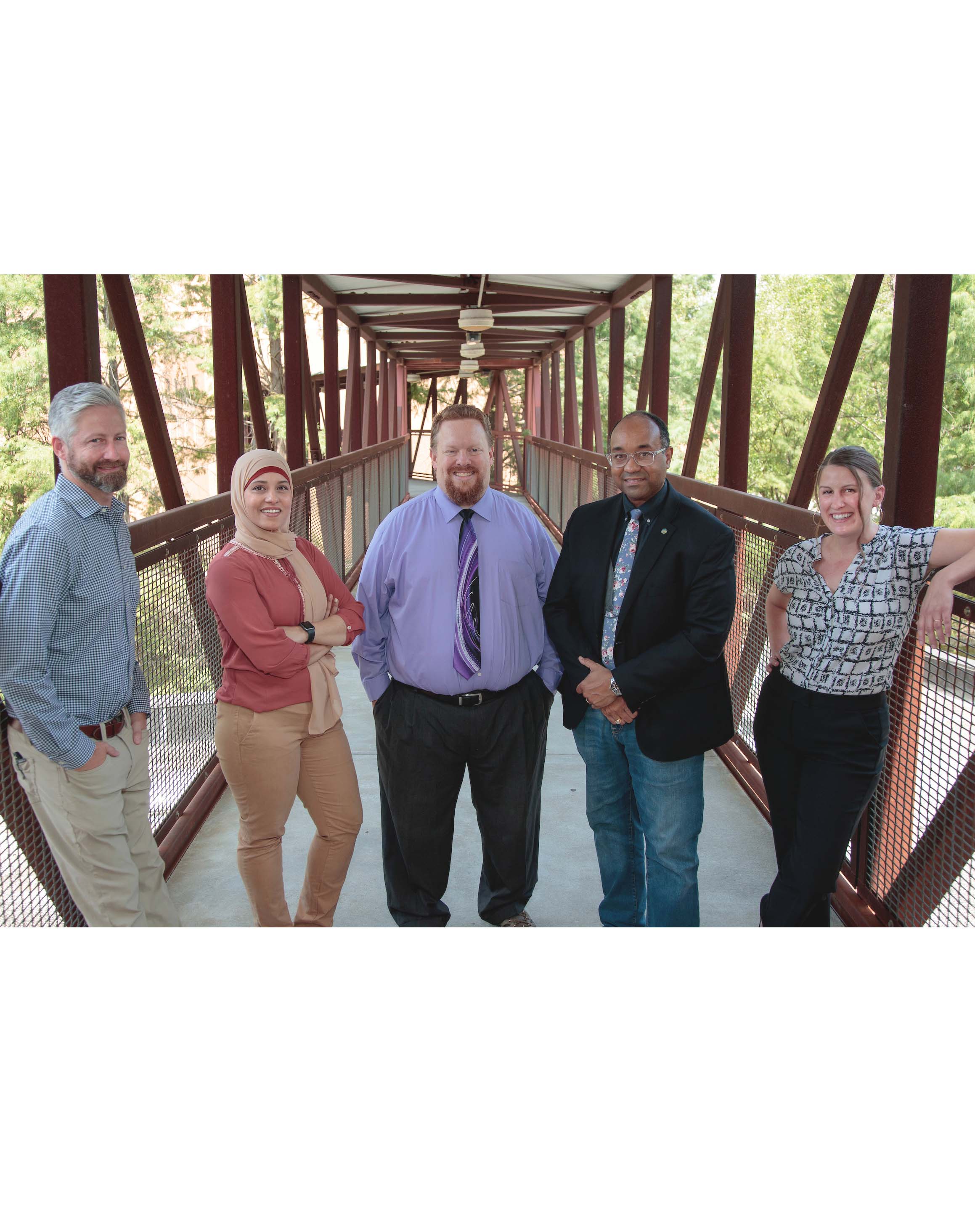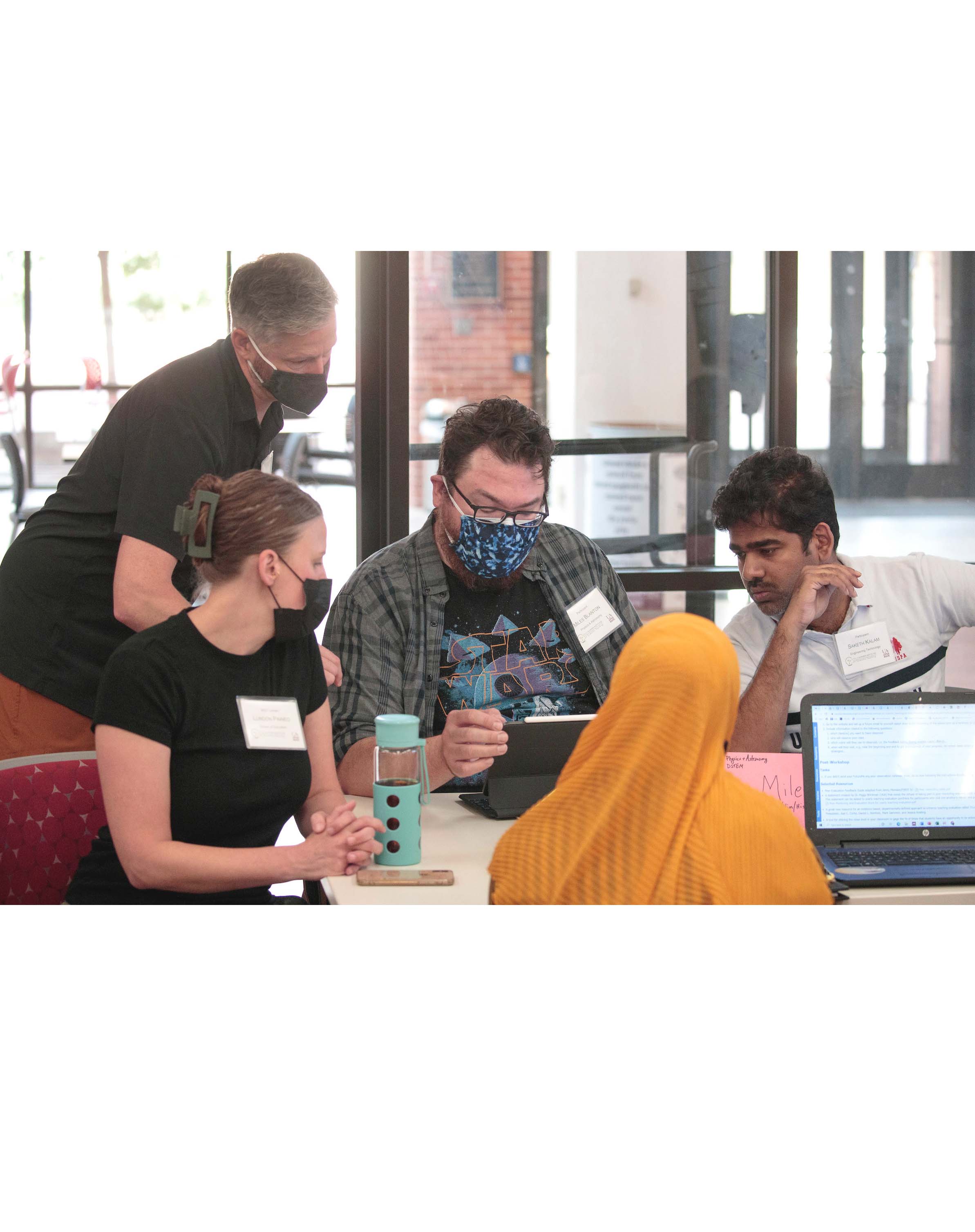Largest NSF Grant awarded to UA Little Rock to support ongoing undergraduate STEM education efforts
September 19-25, 2022
By Angelita Faller
The University of Arkansas at Little Rock has been awarded a nearly $2 million grant from the National Science Foundation (NSF) to enhance teaching and student success in undergraduate STEM education. This is the largest grant UA Little Rock has ever received from the National Science Foundation.
The $1,999,986 five-year grant from the NSF will be used to provide support for faculty and students in the Donaghey College of STEM with a specific focus on supporting students from historically underserved groups. The researchers will use the grant, “NSF IUSE Institutional and Community Transformation Level II: Upholding Active Learning Reform in STEM,” to grow the use of evidence-based teaching practices to increase student engagement and retention in undergraduate STEM education.
“A strong STEM workforce is critical for our country,” said Dr. Lawrence Whitman, dean of the Donaghey College of STEM. “To build and sustain a strong STEM workforce, we must educate students for next-generation careers. To properly educate these students, we must transform our education. I am beyond pleased to see that this funding will continue the excellent work of our faculty. We are grateful to the National Science Foundation and their support of this transformational project.”
The interdisciplinary team led by Dr. Mark Baillie, assistant professor of chemistry, is a collaboration with faculty from the STEM Education Center (Dr. Michael Moore, director of undergraduate research and mentoring), the School of Education (Dr. Lundon Pinneo, assistant professor) and the Office of the Provost (Dr. David Montague, associate vice chancellor for student success). Ronia Kattoum, an advanced instructor of chemistry and Ph.D. student in applied sciences-chemistry, is working as the project’s graduate assistant.
“Our main focus is to increase the number of underserved students who successfully complete STEM courses,” Pinneo said. “We want to identify current barriers for faculty and improve support systems so campus-wide we can close the equity gap.”
Students from historically underserved populations, first-generation students, and Pell Grant recipients are likely to encounter barriers to their success in their lecture-based STEM courses. Baillie says that traditional teaching methods are often a barrier to students reaching their potential.
“People’s journeys through education are very different,” Baillie said. “If you can create a classroom environment that gives everyone the opportunity to engage, then everyone will learn and progress.”
To support faculty members as they learn about and adopt more student-centered and inclusive teaching strategies, UA Little Rock will utilize successful NSF-funded interventions including the expansion of the Mobile Institute on Scientific Teaching (MoSI) and the Learning Assistant Program in the Donaghey College of STEM.
Currently, UA Little Rock is the only higher education institution in Arkansas with these two highly successful programs that focus on faculty and student success. The grant builds upon the previous success of these programs by allowing many more faculty and students within the Donaghey College of STEM to participate in these initiatives.
“UA Little Rock has a rich history in the STEM area, with innovative programming for faculty as well as major initiatives focused on student success,” Montague said. “This funding will certainly help promote the future of STEM education in Arkansas.”
MoSI workshops focus on active learning and other evidence-based teaching practices. Research on teaching and learning shows that students are 1.5 times more likely to pass classes in active learning classrooms than in traditional lectures. Prior to receiving this grant, about 20% of UA Little Rock faculty completed the weeklong workshop on their own time.
The grant will reward future faculty to participate in the workshop by providing a $500 stipend for 75 STEM faculty members to complete the workshop over the next five years. Starting in the spring 2023 semester, faculty will be recruited to join the first cohort of participants.
“This grant highlights the importance of collaboration across disciplinary areas in addressing contemporary challenges,” said Dr. Sarah Beth Estes, dean of the College of Humanities, Arts, Social Sciences and Education. “I’m grateful to the research team for their dedication to issues of equity in education and looking forward to supporting their innovative work as it develops.”
The grant also provides a $975 stipend for 605 students to participate in the Learning Assistant Program. The assistants will provide peer learning support for more than 9,000 of their classmates over the five years of the grant. The stipends will allow greater access for many students who previously couldn’t afford to volunteer for this leadership role.
The Learning Assistant Program began in 2019 with three students supporting a chemistry class with 50 students. For the fall 2022 semester, there are now 42 students serving as learning assistants supporting more than 630 students taking classes in chemistry, biology, math, Earth science, and physics. By the end of the grant period, UA Little Rock plans to support approximately 250 learning assistants per year.
Learning Assistant (LA) Cole Dwyer described how the experience gives the potential for all students to be successful in STEM education.
“Being an LA has meant serving as a beacon of hope and reliability to my peers who were all in my shoes not long ago,” Dwyer said. “I use my role to not only assist in teaching them new, challenging content, but to connect with them from one student to another and allow them to feel heard in their struggles so that we can work through them without shame or misunderstandings.
As an LA in a science course for non-majors, I encountered many students who had pessimistic views on biology, most hoping to just pass the class and be done with it for the rest of their lives. However, through encouragement, effort, and confidence building, I saw firsthand many students develop a love for science and open their minds to explore their curiosities about the world.”
Further opportunities will be provided for faculty who have successfully completed the MoSI workshop to improve their teaching skills. The researchers will form Communities of Practice — small groups of up to five faculty members who will meet bi-weekly to offer peer support and build out their expertise. Faculty members who participate will each receive stipends of $1,000. The grant will also fund one graduate student and one postdoctoral researcher for five years, as well as a series of speakers that will focus on implementing student-centered practices.
UA Little Rock will also create a Community of Transformation annually for faculty members who have participated in the Communities of Practice. This group of 10 change agents will discuss and plan efforts to enact policy changes focusing on student success and closing the student equity gap. The grant also provides up to $5,000 a year for five years for faculty and administrators in the Donaghey College of STEM to implement ideas that emerge from the Community of Transformation.
“We want to emphasize how the departments and programs are encouraging their own teachers,” Moore said. “This is a multi-prong approach by the whole university on how to support a successful culture of teaching. It speaks to the credibility of the support we have across the university and from our partners. This is a win for UA Little Rock.”
Photo Caption:
1. UA Little Rock professors, from left, Mark Baillie, Ronia Kattoum, Michael Moore, David Montague, and Lundon Pinneo are working on a National Science Foundation-funded project to improve undergraduate education in the Donaghey College of STEM.




